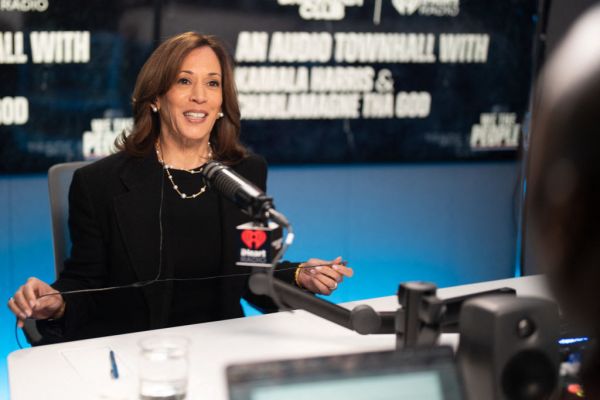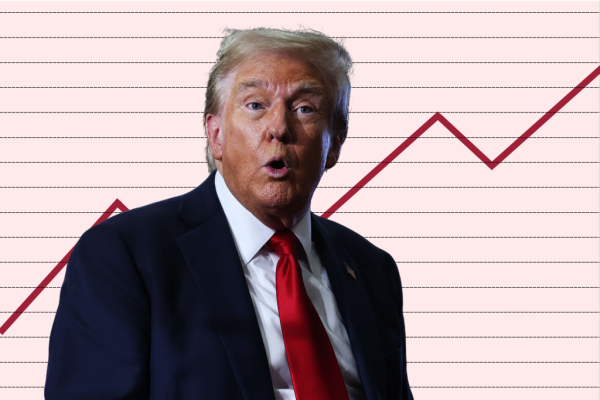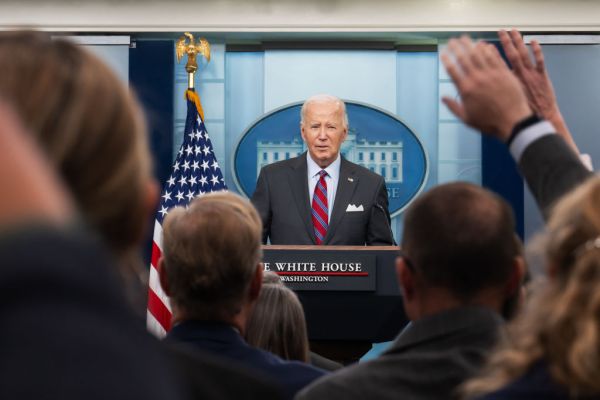There’s an easy way to convince yourself that Kamala Harris should be doing more media.
Just point to her favorability rating and say, “The more voters see her, the more they like her.”
The data don’t lie. After spending nearly three years underwater in measures of popularity, she took off like a rocket in the days following Joe Biden’s withdrawal from the race. By early September she had crossed into net favorable territory, a real achievement for an incumbent vice president serving in an unpopular administration.
And while the early happy-happy-joy-joy vibe of her campaign has faded as the polls have tightened, Harris still retains an edge in likability. The latest New York Times national survey found her leading Donald Trump 43-35 when Americans were asked which candidate was more “fun,” with her biggest advantages coming among the youngest and oldest voters, interestingly.
The more we see her, the more we like her, and so she can only improve her chances of winning by letting us see her as often as possible. The more media, the better!
I don’t buy it.
It’s true that Americans like Harris more now than they did three months ago; it’s also true that they grew to like Biden considerably more over the same three-month period in 2020. Candidate Joe zoomed from -3.3 points in net favorability in July of that year to +6.2 points by Election Day—and it wasn’t because of the charm he flashed during interviews from his basement in Delaware, I suspect.
It was because of the stature he had suddenly acquired from becoming his party’s nominee, the last, best hope of defeating an authoritarian gargoyle. Anti-Trump voters couldn’t help but take a shine to Biden once he was cast in the role of savior. Isn’t it obvious that Harris, a cipher compared to her now-unpopular boss, is benefiting somewhat (or even mostly) from the same effect?
There’s another reason to doubt the claim that “the more voters see her, the more they like her”: Until recently, they hadn’t really seen her at all.
What they saw between mid-July and early October was Kamala Harris masquerading as a generic Democrat. She avoided interviews and stuck to scripted appearances before adoring audiences; she remained scrupulously and strategically vague on policy, allowing voters to fill in the blanks as favorably as they wished. Americans do like generic Democrats, especially when the alternative is the very un-generic Donald Trump.
But whether they like Kamala Harris is another matter. As she began to do more media this month, her net favorability slipped back into negative territory. Four respected national surveys conducted earlier in October suddenly found her somewhere between -3 and -6, the first time she’d had a run as bad as that since the early weeks of her campaign. Maybe it was a blip—more recent polls have her inching back into positive territory—or maybe it was a case of voters watching her interviews and belatedly realizing that she’s not as generic a Democrat as they had hoped.
Today her media blitz will take her to Fox News, where she’ll sit down with anchor Bret Baier. Supposedly she’s also trying to arrange something with podcaster supremo Joe Rogan, a manosphere favorite. Both chats would take place on unfriendly Trumpy media turf, an unlikely venue for a politician whose skill set famously does not include answering questions skillfully.
Why is she doing them?
The lion’s den.
I can think of two reasons why Harris would agree to talk to Fox News, neither of which is encouraging.
Certainly, she’s not doing it because she expects to win over some of Fox’s viewers. The network’s audience opposes her so rabidly that Baier had to reassure skeptical followers on social media that he won’t give her the questions in advance and that her answers won’t be edited to present her favorably. Rather than be impressed with her if she performs well, the Fox faithful are primed to react with paranoia that the interview was “rigged” and rage at Baier for failing to expose her as an idiot. (He has more to lose from this than she does, frankly.)
No, she’s doing it, I assume, because her internal polling has revealed that her habit of ducking media interviews finally caught up to her.
The “generic Democrat” vibe she cultivated by avoiding the press carried her a long way—to the brink of 50 percent in national surveys. But the brink of 50 isn’t enough to win, and lately she’s stalled out there. Some voters must have grown suspicious about why she seems to be running a “basement campaign” of her own. The race can be thought of as a job interview, one in which the guy on the other side of the ballot has already passed by virtue of having held the job in question. She needs to pass it too, and passing an interview necessarily means answering questions.
Doing unfriendly media like Fox is presumably her way of trying to convince those suspicious swing voters that she won’t be out of her depth in the presidency. She may not flip a single Fox viewer by chatting with Baier, even if she aces the test, but the mere fact that she entered the lion’s den and held her own will reassure undecideds that she’s not hiding and hoping to run out the electoral clock without giving them a chance to assess her fitness.
That may be especially important for a woman candidate given the stereotype that women are less willing to confront enemies than men are. By going on Fox, Harris is essentially trying to out-macho Trump: If she has the stones to face hostile media, why doesn’t he?
The other possibility for why she’s chatting with Fox is that she’s simply run out of ideas about how to boost her polling and is throwing everything at the wall. Having been too discriminating earlier in the campaign about which media invitations to accept, she’s now trying the opposite strategy and hoping that something shakes loose.
The same is true of her approach to Trump’s blossoming fascism. Until recently she avoided the subject, believing that the “joyful” vibe of her campaign would attract a majority eager to turn the page on this era. She was mistaken, so now she’s gone all-in on fear, to the point that she’s begun showing clips at her rallies of her opponent sounding like a lunatic. “Ms. Harris’s full-throated attacks on Mr. Trump are a notable break from her previous efforts to minimize him as a vestige of the past,” the Times observed on Wednesday. “Her aides believe voters are still not familiar with Mr. Trump’s statements, nor do they fully understand the stakes for American democracy.”
Harris’ old strategy wasn’t working and so, rather than ride it to defeat, she’s desperate to try something different that might theoretically gain her another 1 to 2 points. “Joy” is accordingly out, and “he’s a fascist” is in. Ducking the media is likewise out, speaking to every media outlet that’ll have her is in. Howard Stern, Call Her Daddy, Joe Rogan, Fox News: If you’ve got an audience, she’ll find the time. She’s leaving it all on the field.
The Fox interview is high-risk for her but also potentially high-reward if she makes a good show. It’s as close as she’s going to get to a second debate with Trump, with his favorite network standing in for him as a proxy. Although the live audience for it will be vastly smaller than a presidential debate, the element of antagonism between the two sides might give it legs online. A solid performance could be worth something to her as clips circulate and eventually make their way to persuadable voters.
And even if it doesn’t move persuadables, there are worse ways to motivate disaffected left-wing voters to turn out than to spar publicly with Fox News.
Ultimately, I think, chatting with Baier is a defensible decision because it evinces confidence in her own abilities, and confidence is reassuring in a politician. What’s discouraging about it is that it’s a risk Harris surely never wanted to take or believed she’d have to take. Once Old Man Biden was off the ticket and replaced with a non-senile nominee, I suspect Democrats assumed they’d be sitting on a 5-point national lead in mid-October. They aren’t. Desperate times call for desperate measures, and giving Fox News an eleventh-hour chance to blow her up on national television is an emphatically desperate measure.
That doesn’t mean she’ll lose next month. But I know which way I’m betting.
‘Weird’ science.
An interview with Joe Rogan makes more sense for Harris than an interview with Fox, and not just because his audience is much bigger.
Nate Silver summarized the logic on Tuesday. In a race as tight as this one, “weird” voters who may or may not vote are potentially decisive. And if you’re seeking out “weird” voters, you need to do “weird”—i.e. alternative—media.
Dive into the polls, he notes, and you’ll see that Americans who aren’t fully committed to their candidate yet are disproportionately young, nonwhite, and independent. There’s room for Harris to grow among those groups, particularly the first two given how they’ve leaned Democratic traditionally. To reach a huge group of young voters (with an outsized percentage of Hispanics) that isn’t reachable through traditional media like Fox News, Rogan’s podcast is ideal.
If nothing else, sitting down with him will signal that she respects his audience and is eager for their support. Harris has been good about that throughout the campaign, recognizing that voters want to be courted even if they’re part of traditional Democratic constituencies. The fact that Trump might soon do a Rogan interview of his own makes it that much more important that she not be seen as conceding the audience to Republicans.
She might not gain “weird” votes by doing the podcast, but she could prevent losing some by doing so. And since Rogan is an amiable interviewer, it’s unlikely that he’ll corner her into making a meaningful mistake. It’s a low-risk opportunity.
But it’s also darned strange, even more so than her sitting down with Fox. Rogan’s podcast is ground zero for cultural populism, after all. To many voters, Harris’ entire appeal is that she’s blocking populism’s path to power. She isn’t “weird”—that’s why her supporters like her and why, I suspect, the overwhelming majority of Rogan’s listeners won’t.
In fact, if Harris versus Baier is a confrontation between left and right (by proxy), Harris versus Rogan is to some degree a confrontation between reality and whatever the hell populists are doing nowadays. Tech writer Charlie Warzel recently put his finger on it in a piece for The Atlantic about conspiracy theorists threatening meteorologists during the hurricanes on the East Coast:
What is clear is that a new framework is needed to describe this fracturing. Misinformation is too technical, too freighted, and, after almost a decade of Trump, too political. Nor does it explain what is really happening, which is nothing less than a cultural assault on any person or institution that operates in reality. If you are a weatherperson, you’re a target. The same goes for journalists, election workers, scientists, doctors, and first responders. These jobs are different, but the thing they share is that they all must attend to and describe the world as it is. This makes them dangerous to people who cannot abide by the agonizing constraints of reality, as well as those who have financial and political interests in keeping up the charade.
By no means is Rogan the most conspiratorial figure in populist media. Because he’s genial by temperament and less consumed with politics than many of his competitors, he never sinks to the “sending death threats to weathermen” depths of right-wing mania. But his show is hugely popular in part because he too provides a comfortable retreat from hard realities at times for his audience. He’s not above casually asserting that “the intelligence agencies were involved in provoking people into the Capitol” on January 6 or hyping snake-oil remedies for COVID or touting uber-crank Robert F. Kennedy Jr. as “the only one that makes sense to me” a few weeks before Kennedy left the presidential race.
It wasn’t long ago that progressives wanted Spotify to drop him for promoting false information about the pandemic. Now here’s Kamala Harris, a sometimes progressive herself, concluding that if you can’t beat ‘em, join ‘em.
She has no choice, right? Reliable voters have made up their minds; it’s all about winning marginal voters now, which means meeting marginal voters where they are. Maybe, but it’s hugely discouraging about the state of the race.
What it means is that some of the worst-informed people in the electorate are likely to decide the presidency. Kamala Harris has been reduced to begging crypto bros who listen to Joe Rogan’s show not to let America descend into fascism because something like 40 percent of college graduates and a metric ton of working-class voters can’t bring themselves to care. The deciding vote in Pennsylvania might plausibly be cast by a Rogan listener who’s torn between supporting Trump because he wants to put RFK in charge of the CDC and supporting Harris because he’s mad at Trump for having helped bring the COVID vaccines to market.
If the election is destined to be won or lost in populist media, then a civic disaster is already upon us, whatever the outcome on Election Day. And if Joe Rogan’s young male audience is the swing constituency, it strikes me as very unlikely that Harris will win. There are too many countercultural forces pulling his listeners toward the GOP; she can’t out-weird Trump and the right, even if she tries to revert to her “generic Democrat” persona during the interview to navigate the eclectic politics of low-propensity populist voters.
She should do the interview if only to spare herself a modicum of second-guessing after she’s defeated, of which there’ll be plenty, about why she didn’t avail herself of every media opportunity available. It’s one thing to lose, it’s another to have to spend her years in political purgatory following the election the way Hillary Clinton has, being derided for having midwifed the Trump era by running a terrible, out-of-touch campaign. “I wasn’t out of touch. I did everything I could. I did the Rogan podcast, didn’t I?” Harris will be able to say later. And that’s good: As this national nightmare begins, it’ll be important to keep the blame where it truly belongs.







Please note that we at The Dispatch hold ourselves, our work, and our commenters to a higher standard than other places on the internet. We welcome comments that foster genuine debate or discussion—including comments critical of us or our work—but responses that include ad hominem attacks on fellow Dispatch members or are intended to stoke fear and anger may be moderated.
With your membership, you only have the ability to comment on The Morning Dispatch articles. Consider upgrading to join the conversation everywhere.